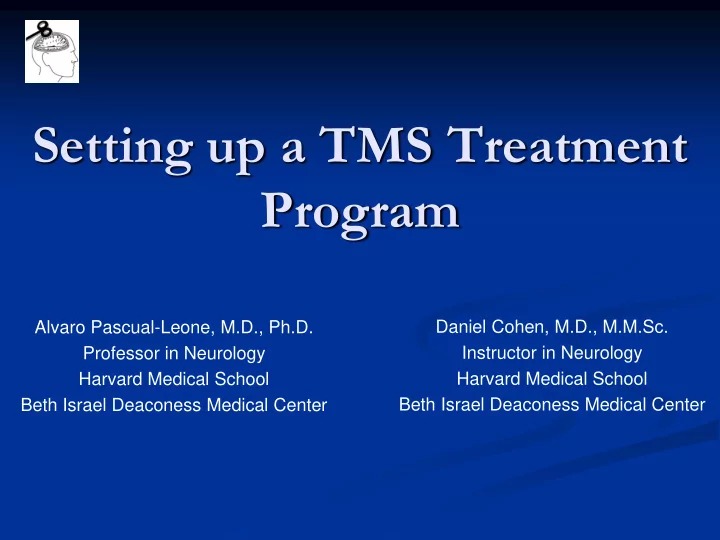

Setting up a TMS Treatment Program Alvaro Pascual-Leone, M.D., Ph.D. Daniel Cohen, M.D., M.M.Sc. Professor in Neurology Instructor in Neurology Harvard Medical School Harvard Medical School Beth Israel Deaconess Medical Center Beth Israel Deaconess Medical Center
Contents Safety and training of personnel Equipment Starting program Certification Evaluation and Consent Treatment Protocol Assessment Managing patients Maintenance Cost/Billing Future Developments Long term plans
Personnel Clinicians (Neurology / Psychiatry) Administrative support Scheduling Providing information to prospective patients Data collection Technicians TMS trained Basic Life Support Patient interaction
Safety Patient selection Family history of epilepsy Personal history of seizure/spells, head trauma, focal findings Epileptogenic medications/combinations Increased ICP, unstable cardiac disease Metallic implants, aneurism clips, med pumps TMS protocol- 10-20hz vs. 1hz
Safety cont ’ d Seizure Response Protocol Staff training in acute seizure response Physician notification Emergency medical services/code team Equipment Crash cart with benzodiazepines Acetaminophen (headaches/neck pain) Ear plugs
Equipment Air cooled coil to prevent overheating FDA-Approved Device (stimulator and coil) Peripheral Stimulation – Magstim, MagVentures, etc. Depression – Neuronetics (only one that can be advertised now)
Initial Evaluation Referral from treating psychiatrist Neurology Contraindications Effect of medication on TMS Psychiatry Caution if: Psychotic depression, bipolar, personality disorders At least one adequate trial of antidepressant medication
Consent Local ethical/safety committee (not IRB!) Discussion of on-label * vs. off-label treatment * “ The NeuroStar TMS Therapy System is indicated for the treatment of Major Depressive Disorder in adult patients who have failed to achieve satisfactory improvement from one prior antidepressant medication at or above the minimal effective dose and duration in the current episode .
Consent cont ’ d Explanation of side-effects Seizure Headache Neck pain Scalp pain Tinnitus/hearing Cognitive side effects (theoretical)
Treatment Protocol Site Hemisphere Frequency Duration Waiting time Repetitions DLPFC Left 20 Hz 2 seconds 28 seconds 40 DLPFC Right 1 Hz 1600 seconds N/A 1 Both protocols give a total of 1600 pulses, Intensity is 110% of MT Neuronetics trial protocol: Left DLPFC 10 Hz, 4sec duration, 26 sec inter-train, total pulses: 3,000 per session 4-6 weeks
Induction Phase Treatments daily (excluding weekends) Mood assessed weekly Duration: Minimum 2 weeks Mean 4 weeks Maximum 6 weeks
Assessment tools Beck, Hamilton, Analogue scale Target symptoms Clinician evaluation of patient Other sources of information (e.g. family, referring psychiatrist) Side effects questionnaire Weekly meeting of all staff to discuss progress
Maintenance Phase Minimal evidence (absence of evidence, not evidence of absence) Relapse prevention Start with weekly treatment Gradually space out sessions “ Watchful Waiting ” Patient presents when feeling worse
Cost Insurance does not necessarily pay $300/session magstim, $350 neuronetics Additional fee for assessments Helping with billing, talking with payers
Reimbursement for TMS Currently its approved rarely on case-by-case basis With FDA approval, carriers will be developing policies Widespread acceptance and coverage still in future
Future Developments Targeting (use of structural MRI ’ s and fMRI ’ s for intensity and targeting?) More than one session/day Interaction of rTMS with medications Predictors of response Monitoring response biologically Other indications (pain, seizures, stroke recovery, Parkinson ’ s disease, bipolar)
Recommend
More recommend